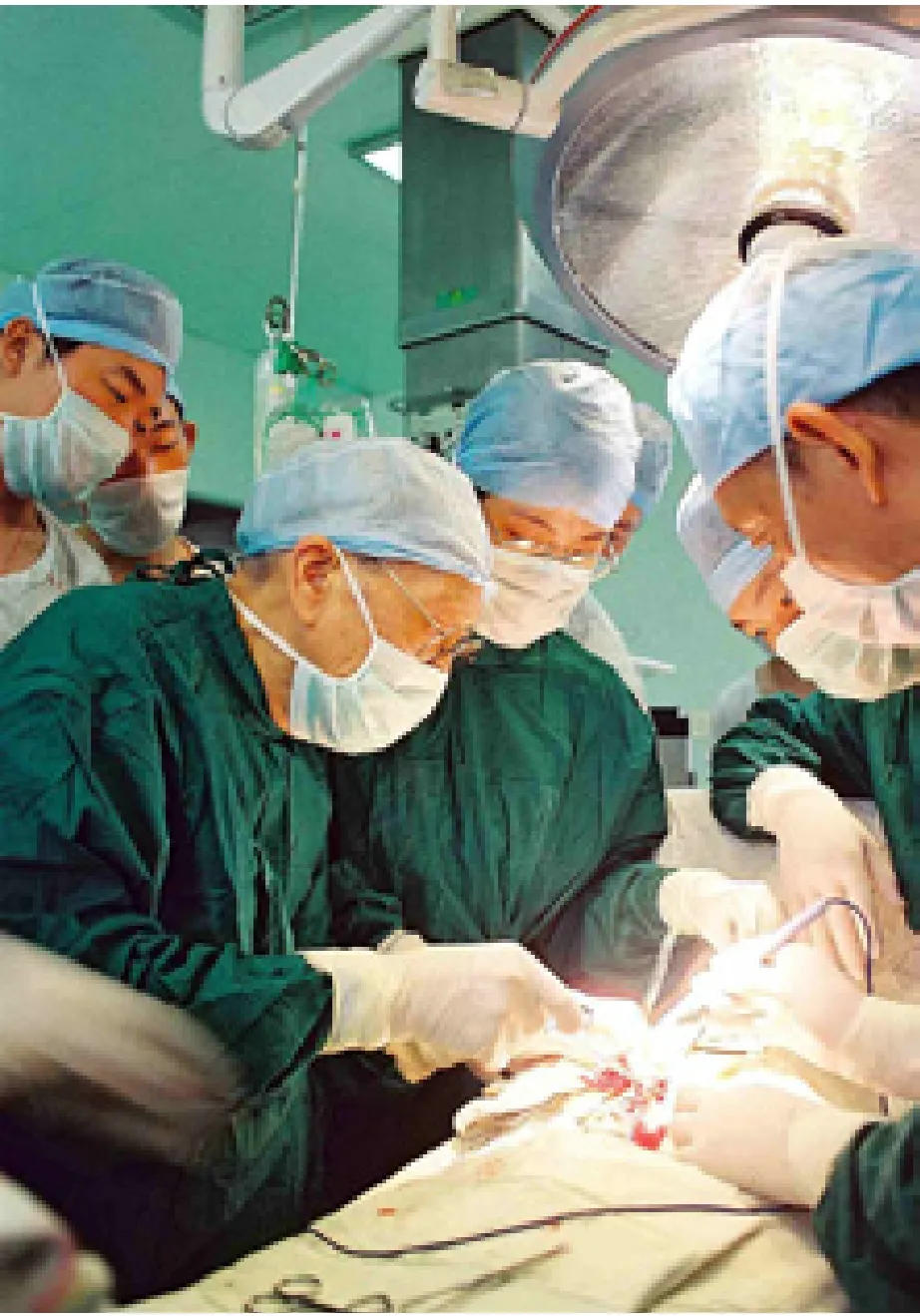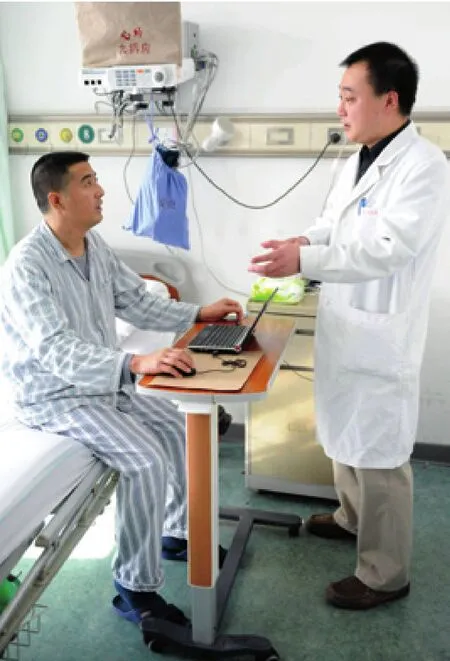A Matter of Life and Death
By WANG HAIRONG
A Matter of Life and Death
By WANG HAIRONG
Cultural beliefs and a flawed donation system stem the flow of in-demand organs for operations
For 33 years, a woman surnamed Feng lived an uneventful life in the countryside of Rizhao City, east China’s Shandong Province. Handicapped since her youth, Feng had limited mobility and was only able to complete schooling through her junior year at the local middle school. Before she passed away, Feng made an extraordinary decision: She would donate her organs after she died.
Feng had thought about becoming an organ donor after watching a special on TV, said Zheng Shitang, Feng’s husband.
Last year, Feng was diagnosed with pneumonia. “The hunchback that had handicapped her when she was young gradually turned into an S-shape, pressing up against her lungs and triggering pulmonary disease,” Zheng said.
Hospitalized in the last days of her life, Feng told her husband she wanted to donate her organs to medical research when she passed away.
She said in her will: “Since I have suffered so much pain, I want to donate my body to medicine so that others are not tortured by the same disease. After I pass away, I would like to donate all my usable organs so my life can continue in other people.”
Zheng objected to the decision at first, but was later convinced, because, he said, this was his wife’s last wish and he could not let her leave with regret.
On February 18, Feng passed away. The same day, staff from the Shandong Provincial Red Cross Society came to the hospital to handle the organ donation procedures.
Now Feng’s kidneys, liver and corneas have saved three lives, and let two visually impaired people regain sight, saidQilu Evening News, a local newspaper in Shandong.
Dire situations
Feng’s decision is unusual in China. Statistics from the Ministry of Health (MOH) show in 2010, fewer than 100 people in China donated organs.

XINHUA
To facilitate organ donation, the government has piloted a human organ donation program in 11 provinces and municipalities since March 2010. The Red Cross Society of China has been entrusted with the administration of donation.
Over the past year, only 37 Chinese citizens donated organs under the pilot program, said the Red Cross Society of China.
Every year, about 1.5 million patients in China need organ transplants, including 1 million in need of kidneys, 300,000 in need of livers and 200,000 in need of hearts, lungs, spleens and pancreases, according to the MOH.
These patients are usually in serious condition, and can only be cured through organ transplants. Currently, 163 hospitals in China can carry out organ transplant operations.
Many die during the waiting process. Yang Yuguo, a 32-year-old man in central China’s Henan Province, was diagnosed with late-stage cirrhosis three years ago. His family hoped to save his life through a liver transplant. They waited for nearly a year, but no liver was available. Early this year, Yang died of gastrointestinal hemorrhage.
Zhang Shuijun, an expert in liver surgery and Vice President of the No.1 Affiliated Hospital of Zhengzhou University in Henan, toldDahe Daily, a local newspaper, five to seven patients whom he had treated died every year while waiting for available livers.
Zhang also said last year, 400 kidney transplant operations were performed in Henan, while more than 10,000 patients there were still waiting for available kidneys.
Obstacles
The huge gap between supply and demand is due primarily to Chinese people’s traditional beliefs and the fawed donation and transplant management system, said Gu Guorong, an executive of the Red Cross Society of Zhengzhou, capital of Henan Province.
“For instance, Chinese people traditionally believe corpses should be kept intact, even if they would be cremated later. It is also considered inauspicious if an applicant for driving license is asked about whether he or she would like to donate organs if they die in a traffc accident,” Gu said.
Besides, he said, obscurity in relevant laws and regulations sometimes left organ donors’ wishes unfulflled.
In China, any family member could obstruct doctors from removing a donor’s organs, even if the donor has completed all required legal documents while alive, Gu said. He said he felt envious that in some Western countries, after a registered organ donor dies, doctors can remove the organs without obtaining authorization from his or her family.
For successful transplants, organs from the deceased are best transferred from a donor to a recipient within 20 minutes after death, medical experts say. Some organs such as hearts, livers and kidneys are best if they are removed soon after the donors are brain dead, but other organs are still functioning.
How to defne death is a delicate issue. In some countries, a brain dead person can be pronounced legally dead.
In China, legal death is still defned as the cessation of heartbeat and breathing. When that happens, some organs will deteriorate quickly and become unft for transplanting later, medical experts say.
“If China can adopt brain death as the criteria for death, and remove the organs of brain dead organ donors for transplantation, more people will be given another chance to live,” said the late Qiu Fazu, one of the founders of organ transplantation in China.
“Determining brain death is quite complicated, because several criteria must be met simultaneously,” said He Yudong, a lawyer with the Beijing-based Zhongce Law Firm. Currently, brain death is prevalently defined as irreversible loss of all functions of the brain, which is caused by brain diseases or severe brain damage, he said.
“Brain death is different from a vegetative state,”said Chen Zhonghua, Director of the Key Laboratory for Organ Transplants under the MOH. “Although a brain dead person can breathe with the assistance of a ventilator and appear alive, he or she has completely lost cerebral functions and a recovery is impossible, whereas a person in a vegetative state may recover.”
“Since the 1980s, some medical experts have called for legislation setting brain death as the legal standard for death,” Zhang said.
But many people in China still believe brain death to be a deep coma, and even an estimated 90 percent of the doctors in the country do not have a good understanding of brain death.
“Traditionally, Chinese people think as long as a person breathes, he or she is still alive, so the general public usually cannot accept removing organs from those who are brain dead,” said Huang Jiefu, Vice Minister of Health.
Huang said he hoped the current regulation on organ donation would be revised so Chinese citizens would be allowed to choose between heartbeat cessation and brain death as the legal criteria for death.
Poor Management

TANG ZHAOMING
China’s current regulations on organ donation took effect in May 2007. “The regulations and a series of follow-up measures taken by the government set organ transplantation in China on the right track,” Huang said.
But he says he agrees with some medical experts who argue the management system for organ donation and distribution in China is underdeveloped.
Critics say although the regulations outline the principles for voluntary and uncompensated organ donation, they do not spell out detailed rules about organ donation and distribution management.
Huang said that the government should set up an effcient donation registration system, guarantee donors’ rights, and ensure the quality of donated organs as well as their equal distribution and rational use.
“The draft for the amendment to the regulations on human organ transplantation has been finished and submitted to the Legislative Affairs Office of the State Council,” Huang told Shanghai-basedChina Business Newsin early March. He predicted the amendment would be promulgated in the
frst half of this year. Huang said around September 2011, a comprehensive organ donation management system would be launched in China. The system will handle organ donation according to information relating to recipients, organs in need, donors and matching.“Health authorities are considering giving financial assistance to donors and their families to encourage donation,”Huang said. Donors and their families might receive a reduction in the cost of medical care and funerals, as well as preferential policies for health insurance and taxation, he said.

